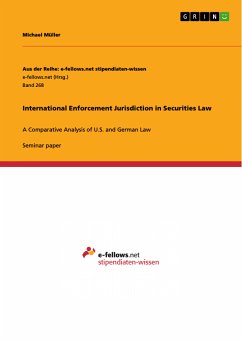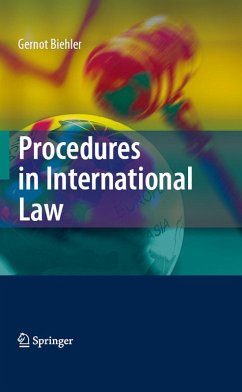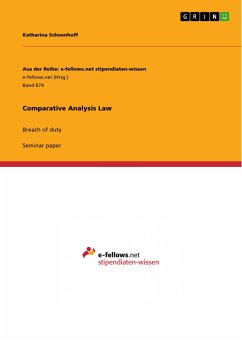
International Enforcement Jurisdiction in Securities Law (eBook, PDF)
A Comparative Analysis of U.S. and German Law
Versandkostenfrei!
Sofort per Download lieferbar
Statt: 27,95 €**
18,99 €
inkl. MwSt. und vom Verlag festgesetzt.
**Preis der gedruckten Ausgabe (Broschiertes Buch)
Alle Infos zum eBook verschenkenWeitere Ausgaben:

PAYBACK Punkte
0 °P sammeln!
Seminar paper from the year 2011 in the subject Law - Comparative Legal Systems, Comparative Law, The University of Texas at Austin, language: English, abstract: Money makes the world go round. If not a truism, at least it holds for financial markets. The amount of capital traded thereupon outreaches human imagination by far. At the same time, financial markets create specific dangers for their participants. These dangers are essentially predicated upon information asymmetries between companies as capital seekers and investors as capital providers. The traditional approach to eliminate these i...
Seminar paper from the year 2011 in the subject Law - Comparative Legal Systems, Comparative Law, The University of Texas at Austin, language: English, abstract: Money makes the world go round. If not a truism, at least it holds for financial markets. The amount of capital traded thereupon outreaches human imagination by far. At the same time, financial markets create specific dangers for their participants. These dangers are essentially predicated upon information asymmetries between companies as capital seekers and investors as capital providers. The traditional approach to eliminate these information asymmetries is by regulation rather than leaving the solution to the market mechanism . Thus, financial markets are regulated markets. The means of such regulation are usually twofold. First, capital seekers are imposed upon a duty to disclose material information. Secondly, if they do not sufficiently comply with this duty, sanctions are imposed. This, of course, poses the question of who can enforce these legal rules. The answer is twofold. Some rules create private causes of action enabling the impaired party to seek relief with the courts. Others provide for enforcement by an administrative agency. This, however, raises the question which agency is called to perform this task. Traditionally, the answer has been easy as financial markets used to be national markets. Consequently, pursuant to traditional concepts of sovereignty in international law, each country could and would determine the competent agency. Regulation was and still mainly is national. Meanwhile, globalization and the revolution in telecommunication technology have blurred the borderlines between originally separated financial markets. Financial markets are now becoming international markets. This reveals an incongruity. Although financial markets are international markets, they are nationally regulated. One might suggest implementing an international regulation to avoid this discrepancy and, indeed, such aspirations can be found to a certain extent. However, on a global stage a uniform regulatory system seems highly unrealistic. Thus, it still falls to national regulators to meet the challenges by the internationalization of financial markets. This paper intends to explore how the United States and Germany grapple with this issue by analyzing the ambit of international enforcement jurisdiction in securities law.
Dieser Download kann aus rechtlichen Gründen nur mit Rechnungsadresse in A, B, BG, CY, CZ, D, DK, EW, E, FIN, F, GR, HR, H, IRL, I, LT, L, LR, M, NL, PL, P, R, S, SLO, SK ausgeliefert werden.













